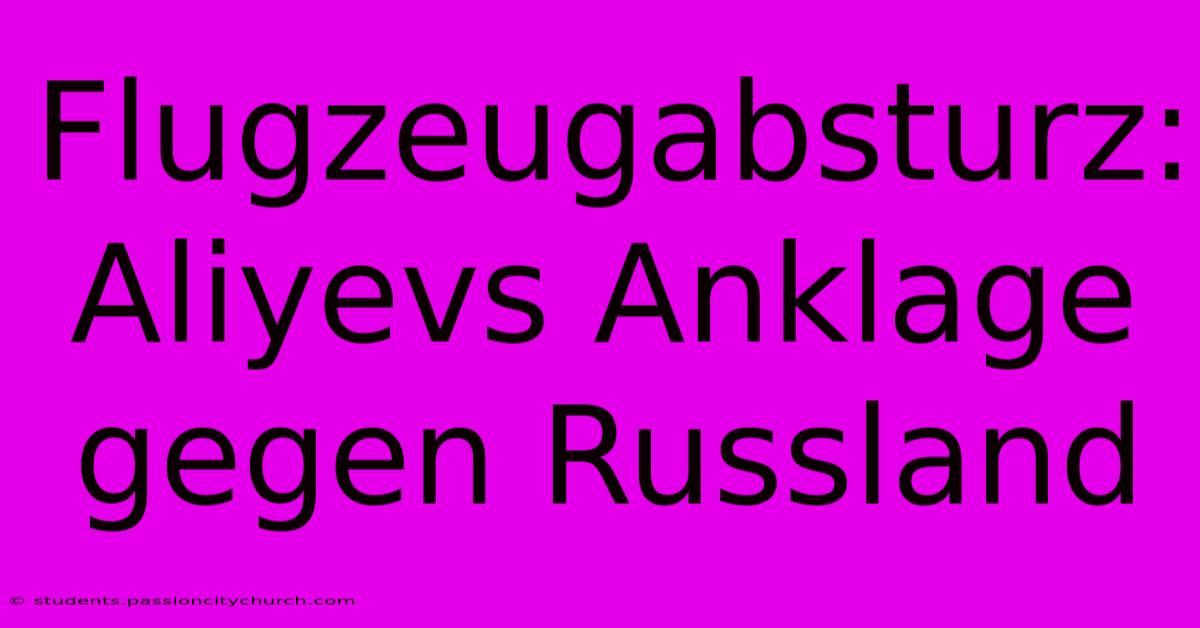Flugzeugabsturz: Aliyevs Anklage Gegen Russland

Discover more detailed and exciting information on our website. Click the link below to start your adventure: Visit Best Website. Don't miss out!
Table of Contents
Flugzeugabsturz: Aliyevs Anklage gegen Russland – A Deep Dive into the Allegations
The tragic downing of a civilian aircraft is always a profound event, demanding thorough investigation and accountability. The accusations leveled by [specify who within the Aliyev family or government] against Russia regarding a specific plane crash (specify the date and flight number if known) have ignited a firestorm of controversy and international scrutiny. This article delves deep into the allegations, examining the evidence presented (or lack thereof), considering geopolitical context, and exploring the potential ramifications of such a serious claim.
Understanding the Context: Geopolitical Tensions Between Azerbaijan and Russia
Before examining the specific accusations, it's crucial to understand the complex geopolitical relationship between Azerbaijan and Russia. A long history of intertwined political, economic, and military ties exists, often marked by periods of cooperation and intense rivalry. [Insert specific historical details relevant to the context of the plane crash allegations. Examples include territorial disputes, energy resource competition, or military alliances]. This backdrop is essential because it influences the interpretation of Aliyev's accusations, providing a framework for understanding potential motivations and biases on all sides.
The Aliyev Allegations: A Detailed Examination
[Specify the precise nature of the allegations. For example, were they accusations of direct involvement in shooting down the plane? Was it a claim of negligence or a cover-up? What specific evidence, if any, was presented?]. This section should meticulously detail the claims made by the Aliyev administration or family member, citing credible sources whenever possible. It's crucial to avoid speculation and present only verifiable information. If specific details are unavailable due to the sensitive nature of the ongoing investigation, state this clearly.
Analyzing the Evidence (or Lack Thereof): A Critical Perspective
This section requires a thorough examination of all available evidence. Consider the following points:
- Eyewitness testimonies: Were there credible eyewitness accounts supporting or refuting the allegations? What are the potential biases and limitations of eyewitness testimony?
- Physical evidence: What physical evidence – wreckage analysis, flight data recorders (black boxes), radar data – exists to support or contradict the accusations? Were these pieces of evidence independently verified?
- Expert opinions: Have independent aviation experts reviewed the available evidence? What are their conclusions? Are there any conflicting expert opinions?
- Communication intercepts: Were there any intercepted communications that could shed light on the circumstances surrounding the crash? If so, are these communications verifiable and authentic?
- Satellite imagery: Has satellite imagery been used to corroborate or challenge accounts of the events surrounding the plane crash?
It's essential to approach the available evidence with a critical eye, acknowledging potential biases and limitations. The goal is not to definitively prove or disprove the accusations but to present a balanced and informed analysis of the existing information.
International Reactions and Investigations:
The international community's response to the accusations is a crucial aspect of the narrative. This section should cover:
- Statements from international organizations: How have bodies like the UN, ICAO (International Civil Aviation Organization), and other relevant international bodies responded to the allegations?
- Reactions from other countries: What positions have other nations, particularly those with close ties to Azerbaijan and Russia, taken regarding the accusations?
- Independent investigations: Have any independent international investigations been launched to determine the cause of the crash? What are the timelines and expected outcomes of these investigations?
The Geopolitical Implications:
The accusations have significant geopolitical ramifications, potentially influencing:
- Azerbaijan-Russia relations: How might these accusations impact the already complex relationship between the two countries? Could this lead to further escalation of tensions or diplomatic efforts to de-escalate?
- Regional stability: What are the potential consequences for regional stability in the Caucasus region, given the existing power dynamics and potential for conflict?
- International relations: How might this impact broader international relations, particularly concerning the roles of Russia and Azerbaijan within the global community?
Conclusion: Unanswered Questions and Future Perspectives
While this article has attempted to provide a comprehensive analysis of the available information, many questions remain unanswered. The ongoing nature of the investigation means that further evidence may emerge, potentially altering our understanding of the events surrounding the plane crash. It is crucial for the international community to ensure a thorough and impartial investigation is conducted, allowing for transparency and accountability. Until all the facts are available and analyzed, it remains impossible to definitively determine the truth behind the Aliyev administration's accusations against Russia. However, by carefully examining the available evidence and considering the broader geopolitical context, we can gain a deeper understanding of this complex and tragic event.
Keywords: Flugzeugabsturz, Aliyev, Russland, Azerbaijan, plane crash, accusations, investigation, geopolitical tensions, international relations, evidence, analysis, Caucasus, regional stability, ICAO, UN.

Thank you for visiting our website wich cover about Flugzeugabsturz: Aliyevs Anklage Gegen Russland. We hope the information provided has been useful to you. Feel free to contact us if you have any questions or need further assistance. See you next time and dont miss to bookmark.
Also read the following articles
| Article Title | Date |
|---|---|
| Epl Result Leicester City 0 2 Man City | Dec 30, 2024 |
| Jimmy Carter 98 Years Of Life | Dec 30, 2024 |
| Milan Vs Roma Eksperimen Fonseca Berbuah | Dec 30, 2024 |
| Absturz Aliyev Beschuldigt Russland | Dec 30, 2024 |
| Bills 40 Jets 14 Key Stats And Highlights | Dec 30, 2024 |
| Linda Lavin From Alice To Broadway | Dec 30, 2024 |
| Live Premier League Leicester Vs Manchester City | Dec 30, 2024 |
| Jeder Hat Seine Meinung Peter Wright Spielt Darts | Dec 30, 2024 |
| Bidenin Ja Carterin Haasteet Rinnakkaisia Polkuja | Dec 30, 2024 |
| Der 100 Geburtstag Von Jimmy Carter | Dec 30, 2024 |
